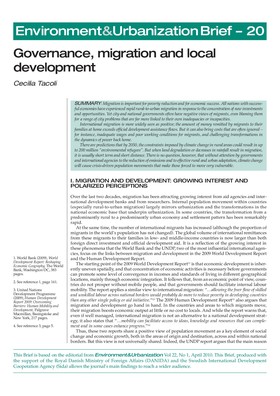Governance, migration and local development

This brief is based on the editorial from Environment and Urbanization Vol 22, No 1, April 2010.
Migration is important for poverty reduction and for economic success. All nations with successful economics have experienced rapid rural-to-urban migration in response to the concentration of new investments and opportunities. Yet city and national governments often have negative views of migrants, even blaming them for a range of city problems that are far more linked to their own inadequacies or incapacities.
International migration is more widely seen a positive; the amount of money remitted by migrants to their families at home exceeds official development assistance flows. But it can also bring costs that are often ignored- for instance, inadequate wages and poor working conditions for migrants, and challenging transformations in the dynamics of power back home.
There are predictions that by 2050, the constraints imposed by climate change in rural areas could result in up to 200 million "environmental refugees". but when land degradation or decreases in rainfall result in migration, it is usually short term and short distance. There in no question, however, that without attention by governments and international agencies to the reduction of emissions and to effective rural and urban adaptation, climate change will cause crisis-driven population movements that make those forced to move very vulnerable.
Cite this publication
Available at https://www.iied.org/10588iied